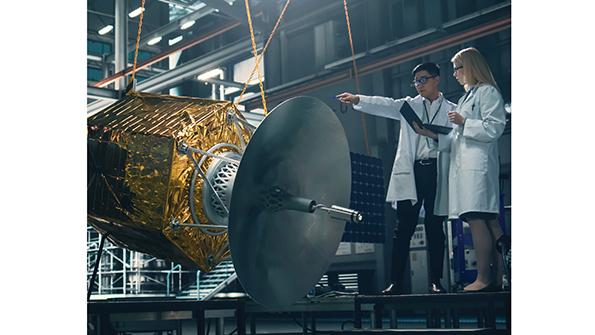Opinion: A Pledge To Create A More Diverse Space Industry

At this pivotal moment for the space industry, innovation is a force multiplier in our pursuit of a sustainable, secure and prosperous space domain for all. Our community has long focused on the urgent need to stay apace with tomorrow’s rapidly evolving threats by leveraging innovative new technologies today.
Yet we have allowed one threat to languish. If necessity is the mother of invention, diversity—of race, gender, experience, thought and perspective—is certainly a progenitor of innovation. While the industry has long talked about cultivating a more diverse and inclusive workforce, the numbers show that we have failed.
The facts are blunt: Not enough women or people from underrepresented groups are graduating from the nation’s top engineering programs. They are more susceptible to falling out of the talent pipeline in grades K-12, when more than 5 million students annually lack quality access to science, technology, engineering and mathematics (STEM) opportunities.
Per Aviation Week’s diversity study of U.S. engineering students, “ethnic and gender diversity has not markedly changed despite focus on this need from professional engineering organizations, trade associations, federal agencies and companies of all sizes.” As a result, fewer overall graduates are entering the technical, often specialized careers that our industry, society and nation desperately need.
No single organization bears the blame for this, nor can any single party provide a comprehensive solution. It is mission-critical and in our collective interest to work together to increase diversity and representation across the industry. Competition is not just healthy; it is vital. Competition for the best talent will drive us all forward, but only if we are competing for a growing pool of talent that represents the full breadth of society and the best ideas it has to offer.
We cannot afford to let innovation suffer by missing out on the potential of large segments of our population. To bolster their representation in the workforce, The Aerospace Corp. joined 25 other space companies in announcing a Space Workforce 2030 pledge at this year’s Space Symposium, and today that list continues to grow. This pledge includes a commitment to sponsor K-12 STEM programs, to increase significantly the number of women and employees from underrepresented groups in the industry’s collective technical workforce and within its senior leadership and to bring the percentage of these populations graduating with aerospace engineering degrees in line with overall engineering graduation rates.
Space Workforce 2030 (swf2030.org) is a collective endeavor by a diverse range of companies, from startups to established primes. This group will meet regularly to exchange ideas and strategies to promote our shared success. Signatories to the pledge (see list) are space executives who have the vision and authority to keep this effort moving forward. It is our collective aim that, over time, this group of leaders will itself become more diverse and representative.
We understand that a degree of cynicism may accompany this announcement. That such a pledge is necessary is a sign that we have historically underperformed in this area. Perhaps its most important characteristic is its call for accountability and transparency through measurement of progress over time: In order to better address the shortfall, pledging companies promise to share aggregated technical workforce data annually at the Space Symposium through 2030.
This problem did not emerge overnight, and it will take time to make the progress to which we aspire. It needs continued focus and effort within our respective workforces and a sustained commitment to empower the millions of young people who comprise the workforce of tomorrow.
Everyone who dreams about space deserves an opportunity to shape its future. We simply will not achieve our full potential in this new Space Age if we do not advance diversity and inclusivity across our industry. This will not happen in a vacuum; we must put our promises into action and hold ourselves accountable for our results.
At Rice University in 1962, President John F. Kennedy famously demanded accountability for his own ambitious moonshot—an achievement he may have anticipated would launch an inclusive future. As he told graduating American University students the following year: “We can help make the world safe for diversity. For, in the final analysis, our most basic common link is that we all inhabit this small planet.” Today, as we find ourselves at the precipice of expanding humanity’s reach farther into the cosmos, we can advance our pursuit of a more prosperous and secure society by upholding our responsibility to all those here on Earth.
Steve Isakowitz is president and CEO of The Aerospace Corp., which operates a federally funded research and development center for the U.S. space enterprise.




Comments